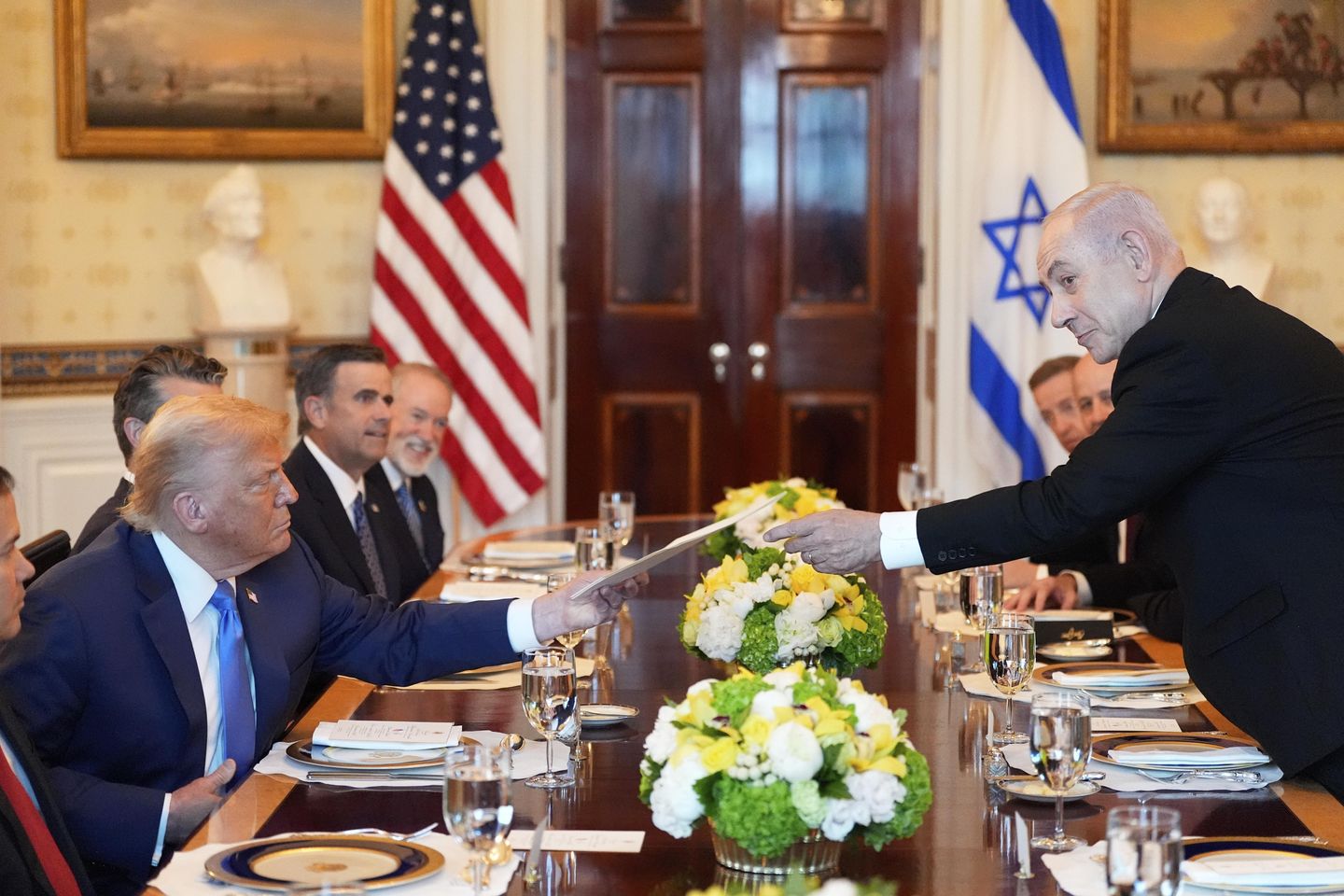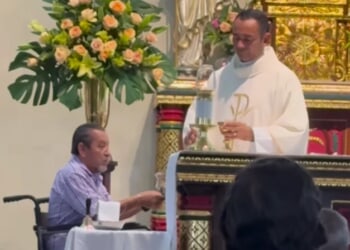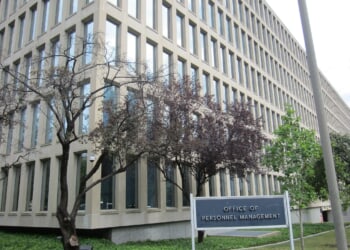
Israeli Prime Minister Benjamin Netanyahu on Monday endorsed President Trump’s proposal to relocate Palestinians from Gaza and turn the territory into a luxury waterfront development.
During a dinner with Mr. Trump at the White House, Mr. Netanyahu said Mr. Trump’s idea for the region was a “brilliant vision” and suggested Palestinians could leave the territory altogether.
“It’s called free choice,” Mr. Netanayahu said. “You know, if people want to stay, they can stay, but if they want to leave, they should be able to leave.”
Mr. Netanyahu added that both the U.S. and Israel are working with other countries to find places for displaced Palestinians to relocate.
“They want to give the Palestinians a better future,” he said. “I think we’re getting close to finding several countries, I think this will give them the freedom to choose. Palestinians should have it, and I hope we can secure it.”
In February, during Mr. Netanyahu’s first visit to Washington, Mr. Trump stirred international controversy when he said that some two million Palestinians could be relocated so the U.S. could take over the territory and develop it into an upscale resort.
He later walked back the suggestion that Gaza could become “the Riviera of the Middle East.”
The conversation was part of a wide range of thorny issues they two discussed, including the future of Gaza, an Israel-Hamas ceasefire and a deal to release hostages the Islamist group seized in its Oct. 7 rampage through southern Israel.
In bid to ingratiate himself to Mr. Trump, the Israeli prime minister told his U.S. counterpart that he submitted a letter to the Nobel Prize committee, nominating him for a Nobel Peace Prize. Mr. Trump has long complained about not winning one for his peacemaking efforts, saying the committee is too left-wing.
The private dinner is the latest effort by Mr. Trump to push for peace in the Middle East following the recent U.S. airstrikes on three nuclear facilities in Iran amid a broader campaign by Israel.
The two nations struck a ceasefire deal, which Mr. Trump has hailed as one of his administration’s biggest accomplishments.
Mr. Trump compared his decision to strike Iran’s nuclear sites to President Truman’s 1945 decision to drop the atomic bomb on Japan to end World War II.
“If you go back a long time ago, it reminded people of a certain other event,” Mr. Trump said. “Harry Truman’s picture is now in the lobby, in a nice location, in the lobby, where it should have been. But that stopped a lot of fighting and this stopped a lot of fighting.”
White House press secretary Karoline Leavitt told reporters at the daily press briefing that the two leaders will “discuss positive developments taking place in the Middle East region.”
“The utmost priority for the president right now in the Middle East is to end the war in Gaza and to return all of the hostages,” she said. “There was a ceasefire proposal that Israel supports that was sent to Hamas, and we hope that they will agree to this proposal. We want to see all of the hostages released.”
Ms. Leavitt said the ceasefire proposal was “agreeable and appropriate.”
She said Mr. Trump’s special envoy to the Middle East, Steve Witkoff, will travel this week to Qatar, where Israeli officials are currently holding indirect talks with Hamas to secure a Gaza ceasefire and hostage-release deal.
Representatives of Qatar and Egypt are also participating in the negotiations.
Mr. Trump predicted Sunday night that an agreement could be reached this week, saying a deal is “close,” while Mr. Netanyahu said his meeting with the U.S. president could help advance negotiations underway in Qatar between Israel and Hamas.
However, several obstacles await.
Israel and Hamas are deadlocked on whether the agreement will lead to a permanent end to the fighting, which has raged for 21 months, barring a six-day pause in November 2023 and a 42-day ceasefire earlier this year.
Hamas would need to sign off on any release of hostages, but it has a new leader after Israel killed several of its top officials.
The new commander, Izz al-Din al-Haddid, took over last week and is said to be strongly opposed to releasing all remaining hostages before a total end to the war in Gaza and a withdrawal of Israeli troops.
While Mr. Netanyahu has demanded the full elimination of Hamas, demanding that the group surrender, disarm and go into exile, which the group has refused to do.
He sidestepped a question about whether Israel wanted a peace deal with Hamas that does not include a fully-sovereign Palestinian state.
“We’ll work out a peace with our Palestinian neighbors, those who don’t want to destroy us,” he said. “And we’ll work out a peace in which our security, the sovereign power of security, always remains in our hands. Now people will say, ‘It’s not a complete state, it’s not a state. It’s not that.’ We don’t care.”
More than 56,000 people have been killed and thousands more seriously injured in the conflict. Israel launched an offensive in Gaza following Hamas’ Oct. 7, 2023, terror attacks in which some 1,200 Israeli and other civilians were killed and around 250 were taken hostage.
Also, skirmishes continue to erupt in the Middle East at a fragile time where not only does the hostage deal hang in the balance, but so does the spectre of Iran restarting its nuclear program.
Earlier Monday, just hours before Mr. Trump and Mr. Netanyahu met, Israel carried out airstrikes against Yemen’s Houthi rebels, one of Iran’s regional proxies.
Israel’s military launched airstrikes Monday morning to take out ports and facilities held by Yemen’s Houthi rebels, which responded by firing missiles at Israel.
The bombing exchange came after Houthi rebels claimed responsibility for attacking a Liberian-flagged cargo ship on Sunday night. The Houthis hit the ship with drones, missiles, rocket-propelled grenades and small arms fire, forcing its 22 crew members to abandon the vessel.
The Israeli military said it struck Houthi-controlled ports in Hodeiada, Ras Isa and Salif as well as the Ras Kanatib power plant.
“These points are used by the Houthi terrorist regime to transfer weapons from the Iranian regime, which are employed to carry out terrorist operations against the state of Israel and its allies,” the Israeli military said in a statement.
In a post on X, Israeli Defense Minister Israel Katz said the Iran-backed militant group would “continue to pay a heavy price for their actions.”
]“The fate of Yemen is the same as the fate of Tehran,” he wrote, referring to Israel’s 12-day bombing campaign against Iran last month.
A least six Israeli soldiers and 10 others were wounded, including some critically, during a major operation Monday in northern Gaza, according to multiple Israeli media reports. The incident occurred when Palestinian fighters detonated an explosive device targeting an armored vehicle transporting Israeli soldiers.
Monday marked Mr. Netanyahu’s third visit to the White House since Mr. Trump returned to office in January, more than any other world leader. The two have long enjoyed a warm relationship.
Ahead of Mr. Netanyahu’s dinner with Mr. Trump, the Israeli prime minister met with Mr. Witkoff and Secretary of State Marco Rubio. On Tuesday, Mr. Netanyahu is scheduled to speak with House Speaker Mike Johnson, Louisiana Republican.
A member of the Israeli Government Press Office said Mr. Netanyahu had an extended meeting with Mr. Rubio, followed by a private talk.
About two dozen protesters gathered near the White House to demonstrate against Mr. Netanyahu’s attacks on Gaza.
“He views this part of the region as having a real chance of being peaceful and prosperous,” Ms. Leavitt said Monday. “But again, we need to end this war. We need to get all the hostages home, and Hamas needs to accept this proposal in order to do that.”
The dinner is focused on Israel’s relationship with Syria as part of Mr. Trump’s efforts to expand the Abraham Accords, a series of deals that normalized relations between Israel and several Arab states during the president’s first administration.]
Mr. Trump last month signed an executive order ending decades of U.S. sanctions on Syria in an effort to give President Ahmed al-Shara, Syria’s new leader, an opportunity to help his country recover after more than a decade of civil war.
U.S. officials have said Syria and Israel are engaged in “meaningful” talks to reduce tensions along their border.
Mr. Netanyahu said before his departure from Israel that “the opportunity to expand the circle of peace” extended “far beyond what we could have imagined before.”







![Florida Man With Violent History Arrested for Choking a Cop [WATCH]](https://www.right2024.com/wp-content/uploads/2025/06/Eleven-Stabbed-in-Attack-at-Salem-Homeless-Shelter-Across-From-350x250.jpg)








